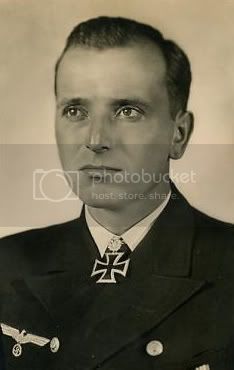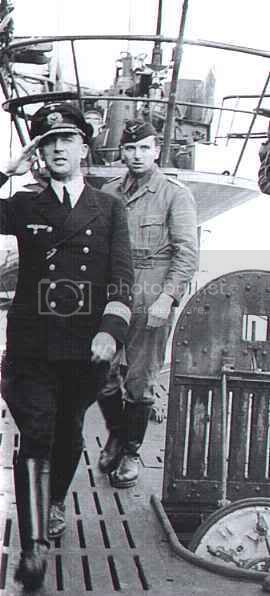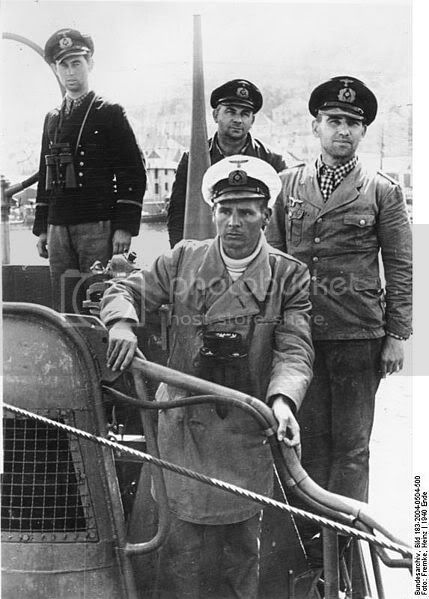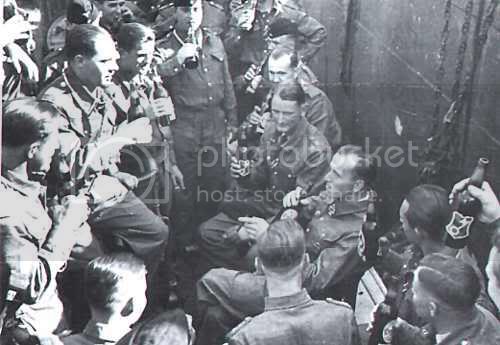
Welcome to instalment ten and final of our brief mini-series of weekly instalments focussed on the Aces of the Deep- the Top Ten U-boat Commanders of World War 2.
The subject of this week’s instalment is Otto Kretschmer

Image courtesy of uboat.net
Otto Kretschmer was born in Heidau, Liegnitz on the 1st of May 1912.
At the young age of just seventeen he spent eight months living in Exeter, England where he learned to speak English fluently.
He joined the Reichsmarine in April 1930, and attained the rank of Seekadett after completing officer training courses as well as three months' aboard the training ship Niobe. He then spent over a year serving about the light cruiser Emden. In December 1934 Kretschmer was transferred to a posting aboard the light cruiser Köln. He then remained aboard the Köln until he was transferred to the U-Boat force in January 1936, where he received extensive officer training and was promoted to Oberleutnant zur See.
Kretschmer's first command was the U-35, a Type VIIA U-Boat, in 1937. He was ordered to patrol the Spanish coast as part of Germany’s involvement in the Spanish Civil War. U-35 finally returned to Germany after an uneventful patrol during which no ships were sunk.
In September 1937, Kretschmer left the U-35 and took command of U-23, a Type IIB coastal U-Boat.
The German invasion of Poland in 1939 found Kretschmer still in command of U-23, and he was soon sent into action. His first war patrols ranged across the North Sea and around the British and Scottish coasts. Kretschmer's first success came in Moray Firth, Scotland where he attacked and sunk the Danish tanker Danmark on January the 12th, 1940 using torpedoes. The British admiralty at that time thought that the tanker had struck a mine as they did not locate any U-boat in the area. Whilst in Moray Firth U-23 also laid nine mines.
A month later on the 18th of February 1940, Kretschmer sank the British fleet destroyer HMS Daring off the Pentland Firth while she was escorting convoy HN-12 from Norway. As a general rule and in the interests of self preservation U-Boat crews usually avoided directly engaging enemy destroyers, so the Daring's destruction was viewed as a very skillful and brave attack by both Kretschmer and the U-23 crew.
In April 1940, after eight patrols, Kretschmer left the U-23 and commissioned U-99 a newly completed completed Type VIIB. Thereafter there was two months' rigorous training and shakedown maneuvers in German waters for both Kretschmer and the crew resulting in U-99 finally going into action in June 1940.

Otto Kretschmer on the right after a patrol in U-99 on the 21st of July 1940.
Image courtesy of u-boat net.
During U-99’s first four patrols Kretschmer started attacking convoys at night on the surface, sinking merchant ships with highly accurate shots, using only one torpedo per target ship in order to save ammunition, and the motto "One torpedo ... one ship" is attributed to Kretschmer from around this time. Kretschmer's tactics were quickly adopted throughout the U-Boat force.

Otto Kretschmer returning from patrol
Image courtesy of Wikipedia.
His most successful patrol occurred in the months of November & December 1940. During that patrol, Kretschmer sank three British armed merchant cruisers, HMS Laurentic , HMS Patroclus and HMS Forfar . Laurentic and Patroclus were sunk on the night of 3rd & 4th of November after they responded to distress calls from the British freighter Casanare, which U-99 had mortally wounded about 250 miles west of Ireland. Forfar was sunk a month later on the 2nd December 1940 while steaming to join up with and escort outbound convoy OB-251. Put together, the three AMCs totalled over 46,000 gross tons. These three successes earned Kretschmer the number-one spot as an Ace of the Deep.

Otto Kretschmer amongst the crew of U-99 after a patrol enjoying the first celebratory bottle of beer (which looks to be a Becks beer as well!).
It is also understood that Kretschmer was also very particular in his conduct towards the crews of torpedoed ships. When attacking lone merchant ships in the early days of the war he was known to hand down bottles of spirits and blankets into lifeboats and give the survivors the course to the nearest land. Apparently on one patrol in September 1940, Kretschmer retrieved a survivor of another torpedo attack who was alone in the Atlantic on a small raft and took him aboard his U-Boat, transferring him later to a lifeboat after his next successful attack.
On his penultimate patrol in March 1941, Kretschmer sank ten more ships, but these were to be Kretschmer's last victims. On the 17th of March, 1941, during a counterattack by British escorts of Convoy HX-112, U-99 was disabled and heavily damaged after repeated depth charge attacks by the British destroyers HMS Walker and HMS Vanoc. Kretschmer was forced to surface and, under fire from the British vessels, scuttled his boat. 40 of his 43 crew escaped before the boat sank and they were subsequently captured by the British.
The 17th of March, 1941 was a grim day for the Kreigsmarine as on this same day British escorts also scored success against noted U-Boat skipper, Joachim Schepke, who was killed aboard U-100 when that boat was rammed and sunk in heavy fog by Vanoc.
Otto Kretschmer's usual standards of high conduct were evidenced again during the sinking of his U-boat; he signaled HMS Walker asking for rescue for his men, he took great pains to ensure as many left the submarine as possible, and constantly assisted some of his crew towards the rescue nets hung from the British destroyer. Kretschmer's own personal strength was evidently failing in the cold water and his own rescue was as the direct result of a British sailor who climbed down the nets and plucked him from the cold water.
Upon his capture, Otto Kretschmer then spent over six and half years as a prisoner of war in the hands of the British. For almost four years he was held in Canada at Camp 30 (also known as Camp Bowmanville) In 1943 the German High Command tried to rescue him and others (Operation Kiebitz) from Camp 30 in Canada however that very daring plan failed.
In December 1947 Otto Kretschmer was finally allowed to return to Germany.
Like so many surviving German naval veterans, Otto Kretschmer joined the post-WWII German Navy, the Bundesmarine. He joined in 1955 and two years later was appointed commanding officer of the 1. Geleitgeschwader (1st Escort Squadron).
Then in 1956 he was transferred to the position of commander of the Bundesmarine's Amphibische Streitkräfte (Amphibious Forces).
From 1962 onward Kretschmer served as a staff officer in NATO before becoming Chief of Staff of the NATO command at Kiel in May 1965.
He finally retired in September 1970 as a Flotilla Admiral.
In his later years Kretschmer was interviewed & consulted for various television and radio programmes about the Second World War and in particular submarine warfare. He appeared in the 1974 documentary series The World at War.
In the mid-1990s Otto Kretschmer served as a technical advisor for the computer game Aces of the Deep, and also recorded several interviews especially for the game's bonus features.

Picture of Otto Kretschmer in 1997
Image courtesy of uboat.net
During a vacation in Bavaria during the summer of 1998, he died in an accident on a boat on the Danube, while celebrating his 50th wedding anniversary.
Ranks attained
9 October, 1930 Seekadett
1 January, 1932 Fähnrich zur See
1 April, 1934 Oberfähnrich zur See
1 October, 1934 Leutnant zur See
1 June, 1936 Oberleutnant zur See
1 June, 1939 Kapitänleutnant
1 March, 1941 Korvettenkapitän
1 September, 1944 Fregattenkapitän
Statistics courtesy of u-boat.net
Decorations received
17 October, 1939 Iron Cross 2nd Class
9 November, 1939 U-boat War Badge 1939
17 December, 1939 Iron Cross 1st Class
4 August, 1940 Knights Cross
4 November, 1940 Knights Cross with Oak Leaves
26 December, 1941 Knights Cross with Oak Leaves and Crossed Swords
Statistics courtesy of u-boat.net
Patrol summary
A total of 16 patrols and 229 days at sea
U-boat U-23 Departed on the 25th of August, 1939 from Wilhelmshaven and returned to Wilhelmshaven on the 4th of September, 1939. A total patrol of 11 days.
U-boat U-23 Departed on the 9th of September, 1939 from Wilhelmshaven and arrived at Kiel on the 21st of September, 1939. A total patrol of 13 days.
U-boat U-23 Departed on the 29th of September, 1939 from Kiel and returned to Kiel on the 16th October, 1939. A total patrol of 18 days.
U-boat U-23 Departed on the 1st of November, 1939 from Kiel and returned to Kiel on the 9th of November, 1939. A total patrol of 9 days.
U-boat U-23 Departed on the 5th of December, 1939 from Kiel and returned to Kiel on the 15th of December, 1939. A total patrol of 11 days.
U-boat U-23 Departed on the 8th of January, 1940 from Kiel and arrived at Wilhelmshaven on the 15th of January, 1940. A total patrol of 8 days.
U-boat U-23 Departed on the 18th of January, 1940 from Wilhelmshaven and returned to Wilhelmshaven on the 29 Jan, 1940. A total patrol of 12 days.
U-boat U-23 Departed on the 9th of February, 1940 from Wilhelmshaven and arrived at Kiel on the 28th of February, 1940. A total patrol of 20 days.
U-boat U-99 Departed on the 18th of June, 1940 from Kiel and arrived at Wilhelmshaven on the 25th of June, 1940. A total patrol of 8 days.
U-boat U-99 Departed on the 27th of June, 1940 from Wilhelmshaven and arrived at Lorient on the 21st of July, 1940. A total patrol of 25 days.
U-boat U-99 Departed on the 25th of July, 1940 from Lorient and returned to Lorient on the 5th of August, 1940. A total patrol of 12 days.
U-boat U-99 Departed on the 4th of September, 1940 from Lorient and returned to Lorient on the 25th of September, 1940. A total patrol of 22 days.
U-boat U-99 Departed on the 13th of October, 1940 from Lorient and returned to Lorient on the 22nd of October, 1940. A total patrol of 10 days.
U-boat U-99 Departed on the 30th of October, 1940 from Lorient and returned to Lorient on the 8th of November, 1940. A total patrol of 10 days.
U-boat U-99 Departed on the 27th of November, 1940 from Lorient and returned to Lorient on the 12th of December, 1940. A total patrol of 16 days.
U-boat U-99 Departed on the 22nd of February, 1941 from Lorient and was sunk on the 17th of March, 1941. A total patrol of 24 days.
Statistics courtesy of u-boat.net
Vessels hit by Otto Kretschmer
4 October, 1939 Glen Farg
8 December, 1939 Scotia
11 January, 1940 Fredville
12 January, 1940 Danmark
24 January, 1940 Varild
18 February, 1940 HMS Daring (H 16)
19 February, 1940 Tiberton
22 February, 1940 Loch Maddy
5 July, 1940 Magog
7 July, 1940 Bissen
7 July, 1940 Sea Glory
8 July, 1940 Humber Arm
12 July, 1940 Ia
12 July, 1940 Merisaar
18 July, 1940 Woodbury
28 July, 1940 Auckland Star
29 July, 1940 Clan Menzies
31 July, 1940 Jamaica Progress
31 July, 1940 Jersey City
2 August, 1940 Alexia (damaged)
2 August, 1940 Lucerna (damaged)
2 August, 1940 Strinda (damaged)
11 September, 1940 Albionic
15 September, 1940 Kenordoc
16 September, 1940 Lotos
17 September, 1940 Crown Arun
21 September, 1940 Baron Blythswood
21 September, 1940 Elmbank
21 September, 1940 Invershannon
18 October, 1940 Empire Miniver
18 October, 1940 Fiscus
18 October, 1940 Niritos
19 October, 1940 Clintonia (damaged)
19 October, 1940 Empire Brigade
19 October, 1940 Snefjeld
19 October, 1940 Thalia
3 November, 1940 Casanare
3 November, 1940 HMS Laurentic (F 51)
4 November, 1940 HMS Patroclus
5 November, 1940 Scottish Maiden
2 December, 1940 HMS Forfar (F 30)
2 December, 1940 Samnanger
3 December, 1940 Conch
7 December, 1940 Farmsum
7 March, 1941 Athelbeach
7 March, 1941 Terje Viken
16 March, 1941 Beduin
16 March, 1941 Ferm
16 March, 1941 Franche Comte (damaged)
16 March, 1941 J.B. White
16 March, 1941 Korshamn
16 March, 1941 Venetia
Statistics courtesy of u-boat.net
This was the final instalment in the series of Aces of the Deep. I hope you have enjoyed the series. I do apologize for the rather intermittent nature in posting them. I am planning to run a further mini series of U-Boat orientated instalments so watch this space.
Footnote
In compiling each instalment I make reference to a number of established reputable sources both web and reference books.
It is acknowledged that a part or portion of the above information may have been sourced from the following sources and credit is duly acknowledged:
Bibliography – websites
Wikipedia
www.u-boat.net/
U-Boats at War
U-Boats in Action Squadron/Signal
www.u-boataces.com
www.historylearningsite.co.uk
www.uboatarchive.net/
www.u-boat-reich.co.uk
Bibliography – books
U-Boats Destroyed: German Submarine Losses in the World Wars by Paul Kemp
Dönitz and the Wolf Packs by Bernard Edwards
Wolf, U-Boat Commanders in World War II by Jordan Vause
German U-Boat Crews 1914-45 by Gordon Williamson and illustrated by Darko Pavlovic
Neither Sharks nor Wolves - The Men of Nazi Germany's U-Boat Arm 1939-1945 by Timothy P Mulligan
U-boat War Patrol: The Hidden Photographic Diary of U-564 by Lawrence Paterson
KRIEGSMARINE U-BOATS: 1939 - 1945 by Chris Bishop
U-Boat Ace: The Story of Wolfgang Luth (Bluejacket Books) by Jordan Vause
U122: The Diary of a U-boat Commander by Karl Von Schenk and Etienne
Iron Coffins: A Personal Account of the German U-Boat Battles of World War II by Herbert A. Werner
Shooting the War: The Memoir and Photographs of a U-Boat Officer in World War II by Otto Giese and James E. Wise
U-Boats: The Illustrated History of the Raiders of the Deep by David Miller
To the Last Salute: Memories of an Austrian U-Boat Commander by Georg von Trapp and Elizabeth M. Campbell
Wolf Pack: The Story of the U-Boat in World War II (General Military) by Gordon Williamson
The Longest Patrol: A U-Boat Gunner's War by Gregory L. Owen
The U-Boat: The Evolution and Technical History of German Submarines by Eberhard Rossler
Hitler's U-Boat War: The Hunters, 1939-1942 (Modern Library War) by Clay Blair
Wolf: U-Boat Commanders in World War II by Jordan Vause
Silent Hunters: German U-Boat Commanders of World War II (Bluejacket Paperback Series) by Theodore P. Savas
The U Boat Commanders Handbook by The High Command of the German Navy, High Command of the German Army, Kriegsmarine, and Wehrmacht
Knights of the Wehrmacht: Knight's Cross Holders of the U-Boat Service (Knights of the Wehrmacht) by Franz Kurowski









